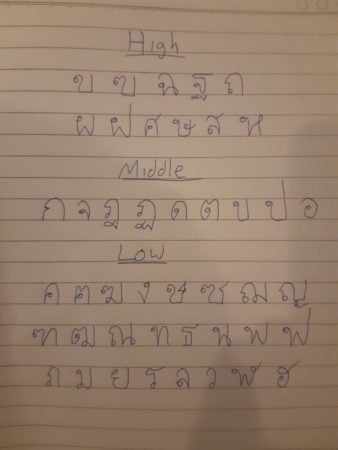
Hello, I’m Ben. In 2017, I started a remarkable journey learning Thai after moving to Thailand.
I have had to force myself to learn because of my location and I made many mistakes along the way as a self-taught language learner who has had literally 0 formal Thai language classes.
At first, overcoming language barriers and fitting into local communities was tough. But with hard work and experience, I’ve improved a lot. I can tell you that learning Thai is definitely possible
I am writing this article to give you tips, tricks, and resources, and to go over the mistakes I made at first so that you can get a head start in your learning process.
I will tell you what I think is important, why it is important, and how it helped me in my gradual and continuous uphill climb to being able to have conversations in my new community and making new friends.
In case you want to know right away the tool I used to help me learn Thai fast, it’s Thaipod101. Using it significantly speeds up the process especially when it comes to memorizing the Thai alphabet, recognizing new words, and learning how to read, which are all essential for learning Thai.
Enter your email below to receive our FREE Thai Language Cheat Sheet. It includes a comprehensive list of downloadable PDFs to quickly get you started learning the Thai language. The Cheat Sheet covers everything, from the alphabet, tone marks, and consonant sounds to vocabulary and much more.
Disclaimer: This article may include links to products or services offered by ExpatDen’s partners, which give us commissions when you click on them. Although this may influence how they appear in the text, we only recommend solutions that we would use in your situation. Read more in our Advertising Disclosure.
Contents
A Bit About My Thai Journey
My adventure in language learning began in Tak.
Then, I moved to Kamphaeng Phet and kept getting better at Thai. Unlike busy expat places like Chiang Mai or Bangkok, these areas are more traditional and have fewer foreigners.
It was hard at first, especially with learning the language, but it gets easier over time.
So, don’t worry; learning Thai can be rewarding and fun!
Being in a foreign country can be difficult, but learning the language makes you feel more connected to the environment around you, even if it seems scary or impossible.
Now, let’s talk about any fears you might have. I get it; I’ve been there too. But I’m here to help ease those fears. Believe me, it’s a journey worth taking.
Is Thai Hard to Learn?
Learning a new language is always hard. If you want to become fluent, or even conversational, you need to learn thousands of words, new grammar rules, new phonetics, understand new phrases and idioms, and more.
It is a daunting task when you have to start from 0. The smaller cultural reach of a language like Thai can make it feel like there are limited resources for you to use, but that is simply not true.
If you live in Thailand, you’re in the perfect environment for learning. When it comes to something as dynamic as language, experience is the best teacher. Here, you’ll have plenty of chances to interact with native speakers, offering a rich and immersive learning experience.
There is a wealth of resources out there. You just have to know where to look, how to use them, and understand the steps you need to take in order to take full advantage of what you have to work with before throwing yourself into the language.
Was Thai hard to learn? Yes. The Foreign Service Institute categorizes languages based on how difficult they are for a native English speaker to learn. There are 4 categories, the higher the number the more difficult it is. Thai is classified as a category 3 language – which means it’s hard to learn since linguistics is totally different from English.
It may feel impossible, but believe me it is not and anyone can do it, provided you actually put the effort in. I did it, and continue to do so, and I do not consider myself a master of languages.
But I am not here to scare you, I have some good news too. There are quite a few things that make this language actually quite easy to tackle in some areas.
Is Thai Language Easy?
When you learn Thai, you also get help from the fact that many words compound to form new words.
This makes it possible to understand unknown words just by looking at the separate parts. For example, you may know that the Thai word for fish is “pla”, and you may know that the Thai word for water is “naam”. “naam pla” a compound of the two words is fish water, or if you like – fish sauce.
This transfers to other liquids too – like “naam som” (orange juice).
The vocabulary of the Thai language is not as extensive as the English language, there are not so many completely different words to remember, and you can get by reasonably well, by learning basics and watching them compound to form new meanings.
The grammar of the Thai language is extremely easy. There are no conjugations, declensions, inflections etc.
Thai words do not change form with gender, person, number, or even tense. Yesterday, tomorrow, already and will, are added to sentence structures to indicate tense. When learning Thai, you don’t need to learn if a word is masculine or feminine (one commonality with the English language), and there are no articles. There are no words for “a”, “an” or “the”, and generally, if a word is not needed to communicate meaning, then it’s omitted, keeping sentences very simplistic in structure.
This makes the vocabulary learning process much quicker as there is only one form of each verb to learn, unlike Spanish or French where you have to learn 60+.
Start with Learning How to Read
I have heard a lot of people say that you shouldn’t learn to read a foreign script until you are proficient in the language. From my experience, this is not helpful.
There are 4 skills you have to master to truly get to grips with a language; speaking, listening, reading and writing.
On the surface, it may feel like speaking and listening are the most important skills to focus on, as that is how you will be communicating with people out in the streets, in the markets, and doing day to day activities like shopping and asking for help.
While this is true, and you definitely should constantly be working on your speaking and your listening, you should not discount the importance of reading and writing.

Why Reading?
When I first moved to Thailand, I knew 0 Thai, not even “hello”. This was not out of ignorance, but because I only had 1 month to prepare myself for my new life out here. I fell into the trap of thinking that listening and speaking were what I should focus on.
My language learning for the first 6 months here felt very slow, pronunciation was hard, the tones were impossible and remembering words was difficult because they were so phonetically alien to me.
That is until one day I had the idea to try my hand at learning to read the script.
There are a lot of sounds in Thai that we are not used to hearing or producing. If you only focus on speaking and listening, these sounds will throw you off balance. You won’t know what you are hearing, you won’t know how to imitate it and so you will hinder yourself.
This is why it’s important to learn reading if you want to learn Thai fast.
Pronunciation
Learning to read helps you to learn the sounds. The nice thing about Thai is that, for the most part, words are spelled the way they sound. There are a few confusing rules in which the writing system works, but they are manageable with practice and patience.
The nice thing about reading is that all of the sounds that are unfamiliar to you will become more familiar through slow, progressive, and purposeful learning of the phonetics of the language.
Thai is a phonetic language; unlike Chinese or Japanese. If you can see, hear and practice the sound of a letter singled out and alone, then you are actually practicing your listening and speaking comprehension at the same time.
Being able to recognize and produce these sounds is very important for communication. As native speakers of English, we hear a lot of accents all the time, but there are always cases of hearing an accent that is difficult to understand.
Listening Comprehension
A common case in English is the difficulty some Asian people have with their R’s and L’s. Your accent will be very strong and difficult to understand for some Thais when you first get here, just as theirs can be when speaking English.
Some words can be muddled up when speaking and listening if you don’t practice the phonemes first. Think of words like correct and collect, grass and glass or fry and fly. It can be confusing for an English speaker to hear these words mixed up and pronounced incorrectly.
You will do the same in Thai, with sounds that cannot be spelled out accurately using our writing system. Learning to read is also learning to listen and speak the language, just in small steps, which is exactly what you need in a difficult language like Thai.
Remembering Vocabulary More Effectively
Moreover, learning to read is very useful in your day to day life. Reading menus, road signs and products in supermarkets is not only essential but can help you pick up more vocabulary.
You don’t know the word for snacks? You can learn it by looking at the aisle signs of a supermarket. Keep forgetting the word for chicken or pork? You can always refresh your memory by seeing it on a menu. Did you eat a delicious new meal that you would love to eat again but cannot remember what the server called it? Read their food cart.
Best Way to Learn Thai
Learning to read is important and it helps you to take baby steps in pronunciation and recognizing unfamiliar sounds in spoken language, but how do you do it? Isn’t it a long and lengthy process? Well, no. Not really.
I learned to read in just 1 month.
ThaiPod101
At first, I could only do it very slowly, but a year later or so, I was able to recognize words and read them as I would read the Latin script. I also took my time with it, so it is definitely possible to do it faster. So how did I do it? With a website called Thaipod101.

ThaiPod101 has a free resource section on its website with vocabulary lists for various situations.
Learn How to Read Alphabet
Their Thai Alphabet Made Easy lesson is a good way to get started learning the Thai alphabet, vowels, and numbers. The lesson is broken down into 25 videos.
If you pin the tab in your browser, watch only 1 or 2 of those lessons a day, and continue this process, you will be able to read and write in just a few weeks. It is done in a really easy to manage way and I couldn’t recommend it enough.
To really cement the information from the lessons, you should keep a notebook for all of the characters that you learn. Write down the symbols, the advice that you are given to remember their shapes and sounds, and practice each character several times.
Writing the symbol helped me retain the memory of the shape as it became a part of my muscle memory. I also wrote the symbols on a separate page at the back of my notebook with no notes. I then used this page for revision to see if I could remember the sound of the symbol I am reading, using my notes to check my answers.
The video does go over revision, but I found it helpful to be able to revise any time I liked.
Related article: The Complete Guide to Learning the Thai Alphabet
Use Their Free Trial
Although the lessons are only available to paid members, you can start the free 1-week trial and actually complete the reading course in the amount of time it takes for that free trial to finish.
You can get a head start before beginning your free trial by using this YouTube video.
Just complete 2 or 3 lessons a day at any time with this freely available video to avoid overexertion or burnout. Later, during your free trial, finish the remaining Thaipod101 Thai Alphabet Made Easy course. This is the same technique I used to successfully learn the entire alphabet.
The website doesn’t ask for credit card details when starting the free trial, so they cannot automatically sign you up and make you start paying without you realizing it, like some websites do.
Set Your Fluency Level
To access the rest of the reading course, set your level to absolute beginner, click the lessons tab at the top of the website, click lessons library, and then search for “ultimate video getting started”.
From here you can find the lesson they left you off at and continue to learn to read. To really make full use of your free trial, you will need to do 2 or 3 lessons a day and make notes.
This will ensure that you will complete the course and have the notes forever to refer to. You may have to leave the reading numbers courses alone so as to not overload your brain, but these are easily learnable with a google search.
Once you are done with their reading course, you can move ahead and learn other courses in the absolute beginner level and then move on to the higher levels.
If you finish all of the ThaiPod101 main courses, you should be able to speak Thai in your daily life.
Read our ThaiPod101 review to find out more about their courses.
Learn Thai from a White Guy
If learning through videos and audio aren’t your style, you can check out Learn Thai from a White Guy.

The founder of the course was in my shoes before. He struggled with learning Thai at first until he found the secret to being fluent in Thai, which is learning the Thai script.
Their Thai courses are mainly about teaching you how to read the Thai script before moving on to common sentence patterns and structures in Thai, which gives you a solid foundation in the Thai language.
One great thing I found from their courses is the lesson explanations, which are on point and cover problems similar to the ones I had before.
Learn Thai from a White Guy is a good alternative for learning Thai for beginners. Once you finish their courses, you can use ThaiPod101’s intermediate and advanced lessons to further improve your Thai skills.
iTalki

To speed up your language learning process, you can use iTalki to find a private online Thai tutor. You benefit from using an online tutor in two ways.
First, he or she can fix your pronunciation right away. Thai is a tonal language, so pronouncing words correctly is challenging, especially if studying on your own. The tutor can correct you before you form the wrong habits.
Second, you can prioritize what you need to learn and what you don’t. For example, you may want to learn Thai to help manage communicate with Thais at work. You can ask a private tutor to come up with a class focusing on Thai business terms.
There are hundreds of online private tutors available on iTalki, each with different tutoring rates. Most of them range from THB250 per hour to THB1,000 per hour.
When selecting a tutor, you can view their profile to see details about their lessons, areas of focus, pricing, and the proficiency levels they cater to, like beginner or intermediate.
There are hundreds of online private tutors available on iTalki, each with different rates.
As of December 2023, the most affordable tutor I found charged $6 USD for a 30-minute session or $8 USD for an hour. Remember, prices can vary, so it’s smart to look around for the best fit for your budget. Normally, an experience tutor would charge you at least $15 USD an hour.
When choosing an online tutor, you can check profiles, teaching history, and ask for trial lessons.
For example, the prices for the tutor I mentioned earlier included a $5 USD 30-minute trial lesson.
Ling

Ling is an app that you can use to help you learn Thai in a fun and engaging way. You play Ling to help you remember the Thai alphabet, build vocabulary, and learn sentence structures.
In addition, there are over 200 lessons that teach you the fundamentals of Thai language. It’s a good application if you’re just starting to learn Thai and want to immerse yourself in the language.
However, you may want to take your Thai language learning seriously. In this case, I recommend using other methods such as ThaiPod101, iTalki, or language schools, in addition to Ling.
For the most recent and up-to-date review and price listings of this app, you can read more about it here.
Best Free Online Thai Language Courses
Learning to read also opens up a whole wealth of resources to you to improve your speaking and listening. A lot of resources use the Thai script due to the limitations the Latin script has phonetically spelling out Thai words.
ThaiPod101
The first resource you should use is, again, the Thaipod101 free Youtube channel. There are great videos on essential verbs to learn. This is great as Thai people don’t say things like “can I have x” but instead just say “want x”, so learning verbs like this is essential for you to be able to do simple things like picking food from a street food cart.
With your ability to read the menu and using verbs to ask for things, you are already 1 step closer to being able to survive your new environment in weeks.
The Thaipod101 Youtube also has a large number of videos for you to scroll through and expand your vocabulary, but if you truly want to use that resource to it’s full potential then you can buy a subscription to navigate their main website which has even more!
Now you can read and can survive in Thailand, you can begin to expand your vocabulary.
Anki
A great free resource for this is an application called “Anki”. Download the app from their website and google search “Anki Thai decks” to add them to the program.
I used “Thai for Beginners – Becker“, “Thai for Intermediate Learners – With Audio – Becker” and “Thai vocabulary frequency 4000“. Other decks are available too like “Thai 1000 Common Wordsords” if 4,000 words seems too large of a deck to you.
You have the options to pick and choose what suits you best, but I really would recommend the 2 Becker decks as they have some very useful pieces of vocabulary in them.
Do the decks one by one, in the order that I listed them. It has helped me to cement the vocabulary and it even gives you extra reading practice as the flash cards are written in Thai.
Don’t try to do all of the decks at once, as it is too much information to take in and will cause you to not retain information. Complete one deck, then move onto another.

I also change the settings a little too by clicking the little cog icon next to a deck, pressing options, clicking the “Lapses” tag and changing “Leech action” to “Tag only”.
If you don’t do this the program will take out words that it thinks you struggle too much with and you won’t see them again unless you trawl through the cards and re-select them. I don’t find this useful because I want to learn all of the vocabulary, no matter how many times it takes me.
You can also change the number of words you learn each day according to your ability.
Comprehensible Thai
Comprehensible Thai is an excellent free Thai language learning resource that shows you how Thais really speak.
It uses the Automatic Language Growth (ALG) approach. This means only Thai is spoken and the teachers don’t translate anything into any other language. The ALG method is how all children acquire language naturally.
No matter what level you’re at, Comprehensible Thai has lessons for everyone. Some of the teachers on the channel teach (or taught) at the AUA school in Bangkok. There are thousands of videos on its channel.
Memrise
Another great free resource is Memrise. This website works in a similar way to Anki, but needs you to write the word correctly using the Thai script. This not only expands your vocabulary; it reinforces your reading even more as well as your writing.
I would say that once you have completed the “Thai for Intermediate learners: Becker” then you will be ready to juggle both Memrise and Anki at the same time.
Courses that I found very useful were “Fundamental Thai”, “Classifiers (Thai script) from Thai for Beginners” and “Thai frequency, top 4000 words”.
Classifiers are important so it is good you learn them through this website. They are words for numbering nouns correctly.
All 3 of these courses are great for expanding your vocabulary but, just as with the Anki decks, you should do them one by one to retain the information. Memrise groups their vocabulary into groups of 5, so you can learn new words according to your ability.
Spaced Repetition
Memrise and Anki both use a technique called “spaced repetition”. What this means is that you will see vocabulary that you find hard to remember more often. Each time you remember it correctly, it will take longer for you to revisit that vocabulary. I found this technique to be great as it trains your short term and your long-term memory.
With Memrise, you need to make sure that you visit the vocabulary using the classic or speed review functions every day as it is not automatic.
To really get the most out of this technique, you have to use each app every single day. Although that sounds like a lot, it has never taken me over an hour a day. It can even be as short as 15 minutes a day.
Once you get good with using this technique with single pieces of vocabulary, you can move onto sentences and phrases. Memrise has a great course called “Contempory Thai Expressions”.
You can use this course once you get really comfortable with the learning technique and the vocabulary that you have already learned.
The sentence structure of Thai is completely different to English, so this is a great tool for learning common phrases to communicate with Thai people and begin your first steps into conversational fluency.
Additional Tips
Learning Thai is a lifelong journey. You can’t expect to become fluent in Thai quickly just by using these resources.
So, I want to offer you some additional tips and tricks based on my experience that you can use for your Thai learning journey.
Maintaining and Cementing Your Reading Skills
One important advice I have for learning to read and write is to spell out names of people or places in your country using the Thai alphabet.
This really helps cement the rules of the writing system both phonetically and with the order of writing. I say this because the writing system is not as simple as writing left to right like with the Latin script.

The symbols all follow the same pattern each time though, so it is not as difficult as it sounds. I would also focus on the symbols and phonetics more than the tone rules.
The tone rules can really hinder your learning progress. Tones will come more naturally to you than the rest, so focus your efforts on what is necessary. I hindered myself at first with the tone rules and had to learn this the hard way.
Do Not Only Use Apps
I also want to emphasize an important piece of advice that I learned the hard way, and I hope it helps you in your journey and helps you avoid the mistakes I made in my early days of learning Thai.
When I started my Thai language experience, I quickly grasped the intricacies of reading using the resources we’ve discussed, like apps and videos. The rapid progress I made with these tools was exciting, but it had its pitfalls. I became so focused on my screen, using Anki and Memrise every day, that I overlooked a crucial aspect of language learning for a while: real-world communication.
While these language tools are valuable, there’s a vast world waiting to be explored with your newfound skills.
Engaging with real people is as important, if not more so, than the apps themselves. In fact, the apps became a bit limiting once I surpassed their scope.
Why, you ask? Well, here are a few good reasons from my own experience:
You May Lack Motivation
Firstly, interacting with locals gives a real-time boost to your communication skills. It’s a feedback loop that fuels your motivation. The more you see yourself improving, the more driven you become to continue.
This enthusiasm becomes lacking when you’re consistently acing app reviews due to the well-ingrained set of phrases once you reach that point with them.
You Can’t Make Real-World Mistakes with Apps
Also, real-life conversations give you the opportunity to make real-world mistakes, a crucial part of the learning process. Embrace these slip-ups; they’re the stepping stones to true understanding.
Language is a living entity, not confined to the phrases in your apps. People react differently, introducing you to expressions and nuances beyond any tool’s reach.
Human interaction like this is something no app can truly replicate. It’s an enriching experience that goes beyond the limitations of language apps. Even with thousands of vocabulary words, it remains a constraint.
Apps Can Limit Your Vocabulary
Remember to set your own limits. Apps, especially with a large vocabulary, can consume your day revising what you already know, taking up valuable time in which you could be learning something new.
Recognize when it’s time to drop an app or a course, particularly if it covers familiar ground you use in everyday communication.
Letting go and knowing when to quit these apps or courses allows you to engage in the benefits of real-world communication as described, allowing your Thai to flourish rather than caging you into a limited and repeated set of words and phrases.
Connect with people, share stories, and evolve as a communicator. Your language journey is a dynamic adventure, so venture beyond the screen!
Once I figured this out, it was like breaking free from a learning rut that had me stuck for ages. The excitement of quick progress had faded, and I felt kind of stuck, not making much headway. But once I got past that, things got easier, and I was back in the groove of learning, feeling motivated to tackle the more advanced levels of the language.
Post App Learning – The Communicative Method
As we move away from the limitations of language-learning apps, let’s explore communicative language learning.
While apps offer a structured introduction, their ability to deliver the depth and authenticity of real-world interactions is limited. Therefore, they should only be a starting point for real conversations.
Why Communicative Language Learning
Now, let’s consider the broader benefits of communicative language learning.
This approach emphasizes using language in practical, real-world situations, encouraging learners to engage in meaningful conversations instead of just focusing on grammar and vocabulary drills. By participating in real-world interactions, learners naturally acquire language skills and learn to communicate effectively in various contexts.
Express Yourself in Appropriate Ways
A major advantage is the ability to express oneself in culturally and contextually appropriate ways. Remember, communication is more than just words.
This method deepens understanding of the cultural nuances in the language, helping learners navigate social situations more easily, something an app can’t teach.
Understand the Language through Real-World Contexts
Communicative language learning doesn’t just maintain familiar vocabulary and phrases from apps; it develops your understanding of the language through real-world contexts. By engaging in actual conversations and practical situations, you’re exposed to new language elements, idioms, and expressions.
This enhances your understanding of Thai nuances, allowing you to absorb and use new elements naturally.
Thus, this method is an active process, continuously expanding your language skills and deepening your understanding of Thai in its living, evolving context.
Immerse Yourself with Native Thai Speakers
If you’re in Thailand, take every chance to immerse yourself in the Thai language. Engage with native Thai speakers: friends, family, colleagues, and even strangers. Whether you’re navigating bustling markets, asking for directions, visiting local stores, or making new friends, using the language in real settings is crucial.

It’s not just about remembering; it’s about internalizing important vocabulary. Words tend to fade if not used regularly. Speaking in real situations ensures the vocabulary sticks, enhancing your language skills naturally.
Find a Language Partner
If you’re learning Thai on your own, finding a language partner is essential. Befriend a native Thai speaker locally, find a friend who’s also interested in learning Thai, or use social media and technology to connect with someone.
The learning experience is richer when shared.
The beauty of real-life language practice is the combination of verbal and non-verbal communication during face-to-face interactions.
Use Non-Verbal Communication
Non-verbal tools, like gestures and facial expressions, add context, making your message clearer. Forgot an item’s name? Point to it and ask, “What is this?” Can’t remember how to express a specific emotion or action? Act it out or use a facial expression.
These non-verbal cues clarify your message and enrich the listener’s understanding, creating a more effective communication experience.
Using non-verbal communication in real situations turns mistakes into learning opportunities.
Language imperfections matter less when nonverbal cues are involved. Corrections and clarifications from your conversation partner blend smoothly with non-verbal communication, making mistakes feel less intimidating.
This approach boosts confidence and advances your effective use of Thai.
Now, on to You
Thaipod101 would be the perfect partner resource to use with everything I have listed to really perfect your speaking and listening practice before coming to Thailand.
Remember, do not neglect my final words and piece of advice to not only rely on these resources. You need to be out with the locals every day to practice what you have learned and read everything you can see.
And do not worry! There is no need to be afraid to talk to people. Thai people are actually very welcoming and appreciative of you learning their language, which makes it so much easier for you and also makes you feel part of the community (which is what this is all for).
If you do not have access to local people, then you should sign up to italki. This resource is excellent as it lets you talk to real natives from the comfort of your own home. You can even pick and choose your teachers and conversationalists.
Speaking and listening to locals is the most important step and test of your knowledge and ability, so you need to do it
Learning the language is the best window into this wonderful, unique, and exciting culture. Being part of the community is the best thing you can do, and learning the language is necessary to achieve this goal.










great…thanks…very informative…start building my zeal haha…and reschedule my time before i start. cheers
Thank you so much!. I hope that one day I will be able to speak, read and write thai soon♥️. God bless you
I first lived in Thailand in the late 1970’s for a five year stint. I taught English and then got in the local advertising business. Later I lived another three years in the middle 90’s. Resources then were Mary Hass, AUA’s paperbacks, Gordon H. Allison & Stuart Campbell’s Fundamentals of the Thai Language black book and the early grade readers kids used in Thai government schools along with the character posters you could buy anywhere. No computers then of course, no internet. The really best book was Saw Sethaput’s Thai to English dictionary. If you could speak clearly folks were impressed, if you could read and write they were more impressed. My friends were all trying to learn too, we helped each other some. Girlfriends as living dictionaries hardly ever worked out. If I was teaching somebody Then I would start with the list of pronouns and some basic nouns and verbs. Then colors and numbers, then days of the week and months of the year and time of day. If you can say basic sentences “The yellow bus will come at 3pm on Tuesday”. I would try to teach the words with thai letters, get that in from the beginning.Transliteration has to be something like Gordon H. Allison or Campbell’s, BP for baw blah, moving to actual thai letters as soon as possible. Avoid international alphabet like AUA, excruciating, as well as the Royal Thai transliterations scheme, unreadable. All the best.
Top Man … Thanks
Thank you for your insights! I appreciate all the detailed information and suggestions.